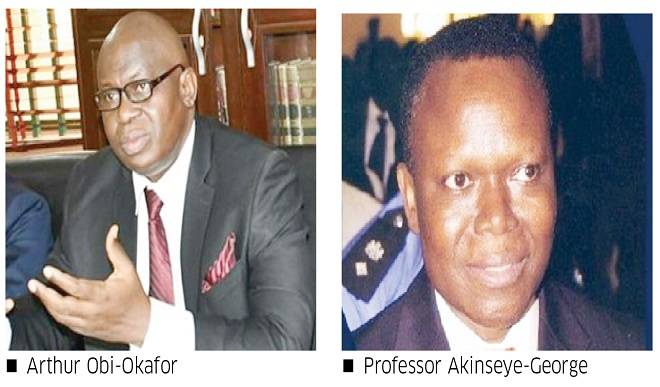
Stakeholders in the criminal justice system have identified nationwide application or domestication of the legislative purpose of the Administration of Criminal Justice Act (ACJA) as one of the act’s major challenges.
By its domestication and application across the country, it is expected that through it, a national criminal procedure law that will regulate the investigation and prosecution of offences throughout the federation would have been introduced.
Thus, the emerging issues and challenges in ACJA (2015) was the focus of lead speakers and panellists at the recently held Nigerian Bar Association (NBA) Abuja branch’s Annual Lecture in honour of the Chief Judge of the High Court of the Federal Capital Territory (FCT), Justice Ishaq Bello.
Justice Bello, who played key role in the drafting, passage and implementation of the ACJA, is now the chairman of the Administration of Criminal Justice Monitoring Committee (ACJMC).
The chairman of NBA Criminal Justice Reform Committee, Arthur Obi-Okafor (SAN), in his paper stressed that, “It could be argued that laws in a federation need not be uniform as a result of the fiscal, social and legal diversities of the federating states, but because modern criminality, especially emerging crimes, are increasingly becoming well organised and trans-border. There is, therefore need to ensure that investigations and prosecution of criminal offences are conducted in coordinated, consistent and collaborative manner, using the same or similar standards, norms, rules, procedures and practices, as well as same range of sanctions.”
He said with only 12 states and the FCT so far implementing ACJA or the Administration of Criminal Justice Law (ACJL) as the law guiding their criminal procedure, there is need to encourage consistency in the provisions of the laws.
Okafor said currently, there are a number of provisions in ACJA and various ACJL that are divergent. For example, he said, while Section 15(4) of ACJA provided that confessions may be recorded electronically in video, similar provisions in some states such as Lagos, Anambra, Enugu and Ekiti make it mandatory. He however added that a recent Court of Appeal order has held that the “may” in that section of ACJA should be read as “shall”.
He said another major challenge of ACJA was that despite its passage since May 15 2015, most of its provisions are not yet implemented, and most people within and outside the law community are not even aware of its provisions.
Lack of data or statistics was another challenge identified. Okafor stressed that Section 16 of ACJA provides for setting up the Central Criminal Record Registry, and also requires officers in charge of police stations or police commands to transmit to the central registry the relevant information on arrested suspects and whether or not they are charged to court.
He added that this is an important provision that needs to be fully implemented.
On his part, Professor Yemi Akinseye-George (SAN), a member of the ACJMC, observed that if Order 3 Rule 5 of the ACJA Practice Direction is properly applied, full-blown trials will become unnecessary in several cases as most of the preliminary issues that usually occasion delays would have been dealt with at the pre-trial stage.
This rule, he said, provides that the court shall consider all issues raised at the arraignment and case management hearing and resolve matters raised in the interest of justice within five working days of the arraignment and case management hearing.
He said although this practice direction took effect since April 25, 2017, the courts and practitioners hardly observed it. He called for training for judges and practitioners on the importance of applying the practice directions.
“A prosecutor who plans to rely solely on confessional statement which at the pre-trial case management stage becomes clearly inadmissible, would reconsider his plan and withdraw same at that stage. This will save considerable judicial time,” Akinseye-George said.
He identified challenges to the ACJA to include, persistent delays, non-compliance with practice directions and intimidation of hard-working judges through petitions. On the problem of trial de-novo, he said it can be addressed with the use of electronic recording facilities in all court rooms. This was another identified challenge together with non-compliance by counsel with frontloading or disclosure protocols as required by the practice directions.
Professor Akinseye-George stressed that the survival of Nigeria’s democracy depends, not on what politicians do or fail to do; but on the extent to which the legal profession, including judges, prosecutors and legal practitioners take seriously the all-important task of justice dispensation.
He said ACJA is undoubtedly a major step forward in the direction of improving the delivery of criminal justice in the country. However, much remains to be done in providing the human, material and institutional resources necessary to ensure an effective implementation of the law.
“Despite its numerous challenges, the judiciary has shown leadership and readiness to tackle the perennial problem of delay of justice. The Nigerian people and the Bar in particular must respond with the right attitude and support for the judiciary to enable actualization of the lofty objectives of the Administration of Criminal Justice Act,” he said.
Justice Bello, in whose honour the lecture was held, said while the ACJA was introduced to improve and speed up the criminal procedure, stakeholders should be vigilant to ensure its provisions are followed to the letter.
“We want speed in criminal procedure; we cannot then give room for trumped up and frivolous charges. Doing this will be akin to replacing an evil with another evil,” he said on the need for prosecutors to seek and get leave of courts of higher authority before filing charges, as provided by the Act.

 Join Daily Trust WhatsApp Community For Quick Access To News and Happenings Around You.
Join Daily Trust WhatsApp Community For Quick Access To News and Happenings Around You.


